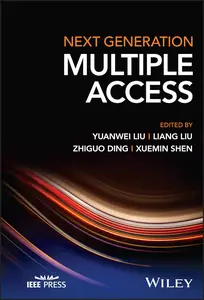
Free Download Next Generation Multiple Access by Yuanwei Liu, Liang Liu, Zhiguo Ding
English | February 6, 2024 | ISBN: 1394180497 | 624 pages | MOBI | 41 Mb
Highly comprehensive resource investigating how next-generation multiple access (NGMA) relates to unrestricted global connection, business requirements, and sustainable wireless networks
Next Generation Multiple Access is a comprehensive, state-of-the-art, and approachable guide to the fundamentals and applications of next-generation multiple access (NGMA) schemes, guiding the future development of industries, government requirements, and military utilization of multiple access systems for wireless communication systems and providing various application scenarios to fit practical case studies.
The scope and depth of this book are balanced for both beginners to advanced users. Additional references are provided for readers who wish to learn more details about certain subjects. Applications of NGMA outside of communications, including data and computing assisted by machine learning, protocol designs, and others, are also covered.
Written by four leading experts in the field, Next Generation Multiple Access includes information on:Foundation and application scenarios for non-orthogonal multiple access (NOMA) systems, including modulation, detection, power allocation, and resource managementNOMA’s interaction with alternate applications such as satellite communication systems, terrestrial-satellite communication systems, and integrated sensingCollision resolution, compressed sensing aided massive access, latency management, deep learning enabled massive access, and energy harvestingHolographic-pattern division multiple access, over-the-air transmission, multi-dimensional multiple access, sparse signal detection, and federated meta-learning assisted resource managementNext Generation Multiple Access is an essential reference for those who are interested in discovering practical solutions using NGMA technology, including researchers, engineers, and graduate students in the disciplines of information engineering, telecommunications engineering, and computer engineering.










Leave a Reply
You must be logged in to post a comment.